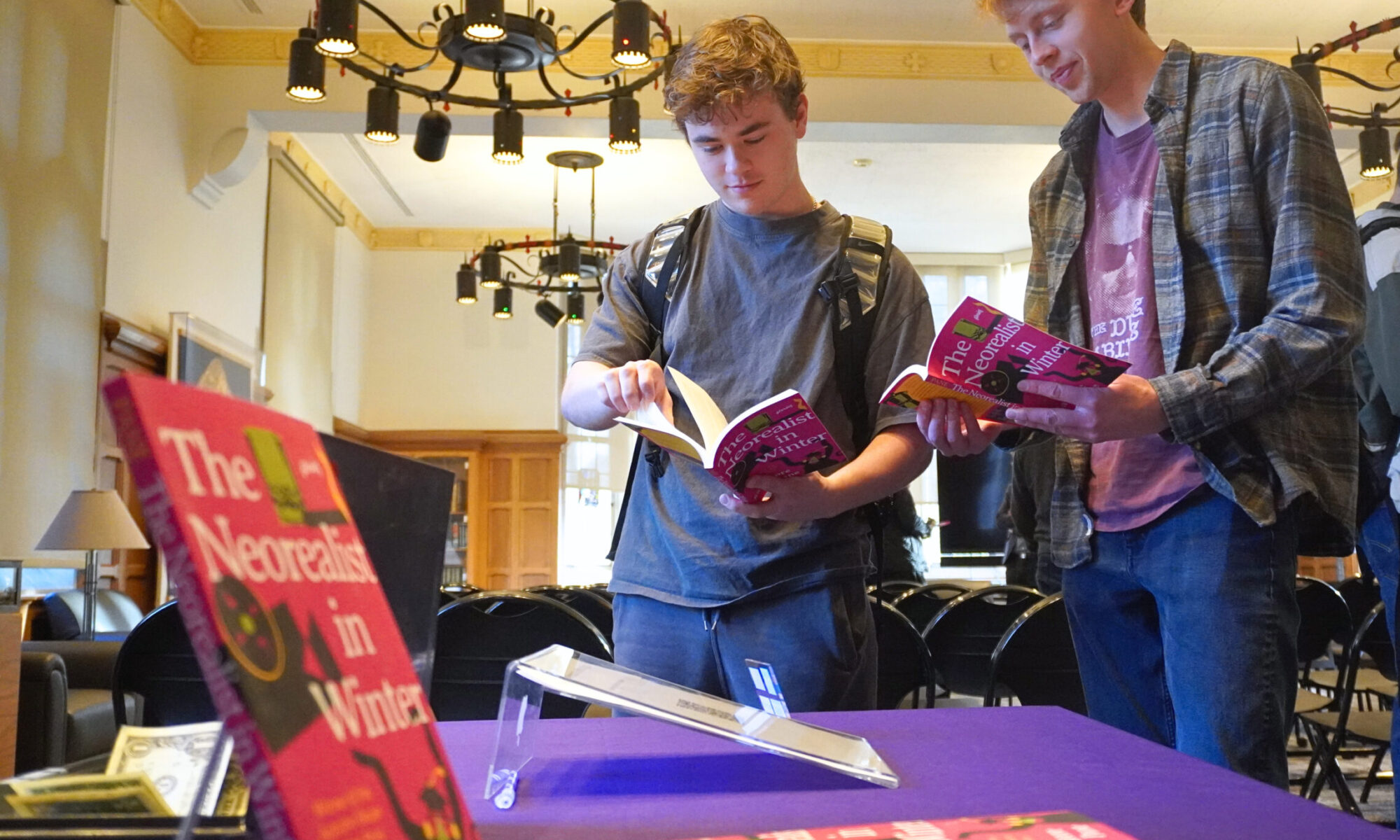Salvatore Pane, a creative writing professor at the University of St. Thomas, held a book discussion with english professor Todd Lawrence for his new short story collection, “The Neorealist In Winter: Stories.”
Pane’s collection features stories and characters that are thematically linked instead of linked in terms of characters or settings. It introduces themes of obsession, PTSD, pop culture and Italian identity, among others.
“The characters are just completely buried in their phones, or in TV shows, or distractions from their real lives,” Pane said.
Nonprofit publisher Autumn House Press holds a contest every year where they publish a collection of fiction, poetry, and nonfiction. Pane entered the contest, and “The Neorealist in Winter: Stories” won the Autumn House Fiction Prize in 2022. The book was published in October of 2023.
Pane primarily teaches creative writing, but he also teaches video game writing and Italian film courses. He has written two novels, “The Theory of Almost Everything” and “Last Call in the City of Bridges.” He also wrote a nonfiction book titled Mega Man 3 and is co-writing a textbook about writing video games.
Pane has taught for 14 years but said he has been a writer for even longer.
“I always knew I wanted to be a writer, even as a kid. My favorite thing to do was write stories as a child,” Pane explained. “My mom read to me a lot as a kid, and that helped. I read a ton, and when I was in high school, my English teachers said my writing was good. I liked writing, but I never thought that it could be anything or lead anywhere.”
Pane’s new short story collection challenged him in a new way as the writing process had a longer timeline compared to his other writing projects.
“This book was about ten years of work,” Pane said. That’s not typically how I work when writing a novel, a book of nonfiction, or a textbook.”
“This process was different because I wanted them to feel cohesive and thematically linked,” Pane explained. “I would write one story first, and then I’d write another story that didn’t feel like it fit. I waited until I had about ten stories that felt like they were in conversation with each other.”
As a writing professor, Pane encounters students struggling with writing.
“It’s a long-distance game, and it takes a long time. It’s okay if it takes five to ten years to start hitting your groove and mastering your voice finally. Stay at the desk and stay in the story. It’s important to keep writing,” Pane emphasized.
Another challenge Pane encountered in the writing process was getting in front of a crowd and reading his work.
“It feels way too personal. Even the thought of having to talk in front of ten people about this is extremely anxiety-inducing. I think most writers would tell you they don’t like that process, even though it’s so nice when people are coming to support you. They want you to succeed. Everyone’s there because they want the event to go well.”
Despite nerves about the book discussion, Pane discussed his short story collection with Lawrence with excitement. The discussion took the form of a conversation between the pair, with Lawrence asking questions and Pane sharing his answers. They explored a variety of topics, including how Pane’s characters wrestle with obsession, PTSD and depression.
Alejandro Vega, a student at St. Thomas, attended the book discussion. “I found it interesting when they talked about how harmful it is that writers sometimes feel the need to give up everything to write and make art. That can take a toll.”
Pane explained during the discussion that he doesn’t think personal lows necessarily need to find their way into the characters he writes. “I’m sure there are exceptions, but in my experience, this kind of writing shouldn’t be your therapy,” Pane added.
“He pointed out that it can be destructive to think you have to be a hurting artist to produce hurting characters. That was fascinating to me,” Vega said.
Pane discussed how he finds inspiration for his characters.
“I get inspired by everything. Even when I’m wandering around, just meeting different people, I often have to stop myself from taking notes. I’m often asking myself, can I use this for a novel? Can I use this for a story?”
Pane mentioned that reading also plays a role.
“So often, I’ll be reading something and it’ll trigger something in my brain that’s completely different. But it leads to a short story or a novel.”
The Neorealist in Winter is Pane’s first short story collection, and he expressed that people may be drawn to it for different reasons than a novel.
“It’s designed so that you can just pick it up and read it, in any order. You can read one or two stories at a time; you don’t have to read the whole thing. I hope it is accessible to people who are not typically short story readers.”
Despite challenges in the writing process, Pane decided that the process was incredibly rewarding.
“Hearing from readers, hearing from people who the book spoke to them in some way or that they were touched or surprised by something is the most rewarding feeling,” Pane said.
“It’s still shocking that people read it! You spend so many years in isolation, working on this thing. Nobody knows about it, but then it comes out, and suddenly, people have thoughts about it. It’s always amazing to see that it’s connected with people,” Pane said.
Sabrina Thompson can be contacted at thom4836@stthomas.edu.






